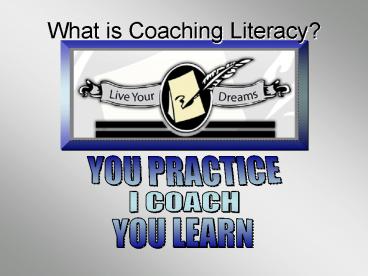What is Coaching Literacy - PowerPoint PPT Presentation
1 / 34
Title:
What is Coaching Literacy
Description:
The Coaching Literacy methodology, developed specifically for one-on-one ... Follow coach's directions; Operate on rhythm and instinct: No inner dialogue. ... – PowerPoint PPT presentation
Number of Views:302
Avg rating:3.0/5.0
Title: What is Coaching Literacy
1
What is Coaching Literacy?
YOU PRACTICE I COACH YOU LEARN
2
Coaching literacy is a reading and writing
tutoring program that promises to
remove learning barriers for
under-prepared students.
- Coaching litera
3
When we teach students how to write in the
classroom, we usually begin by telling them what
they need to know. In other words, students learn
to do.
4
The Coaching Literacy methodology, developed
specifically for one-on-one instruction, creates
new instructional options for under-prepared
students.
5
They learn new techniques for reading and writing
without needing technical instruction. What
students need to know reveals itself as a result
of their doing the work first. In other words,
students do to learn.
6
Students who have been struggling with their
reading and writing have a new world of
opportunity.
7
The simplicity of the program also enables those
being tutored to have the training to tutor
others in reading and writing.
8
By teaching what they have learned, students will
have continuing education opportunities plus
leadership and community service opportunities as
they will make a difference for others by
tutoring.
9
What Coaching Literacy is Not
- Teaching Students How to Read and Write
10
What Coaching Literacy is Not
- Group Instruction
11
What Coaching Literacy is Not
- Planned PresentationsTeacher-Centered Education
12
What Coaching Literacy is Not
- Learning from the Outside In
- Learning to Do
13
What Coaching Literacy Is
- Training Students to Be Writers Through
One-on-One Instruction.
14
What Coaching Literacy Is
- Personalized InstructionStudent-Centered
Education
15
What Coaching Literacy Is
- Doing to Learn
- Learning from the Inside Out
16
Promises of Coaching Literacy
- No explanations to understand or figure out, thus
removing a learning barrier. - Students wont need to depend upon anyone for
developing mastery
17
Promises of Coaching Literacy
- Writing college level sentences and paragraphs.
- Begins with subjects and verbs and builds more
complex sentences from there - A Writing Road to College Reading
18
Promises of Coaching Literacy
- Writing college level sentences extemporaneously
- Creating in the moment before figuring out what
to say
19
HOW?
20
Four Levels of Competence
- (1) Unconscious incompetence
We dont know enough to know that we dont know.
21
Four Levels of Competence
- (2) Conscious incompetence
We know where we lack knowledge.
22
Four Levels of Competence
- (3) Conscious competence
When we first learn how to do something, we think
about what we are doing, and inner dialogue is
present. Our knowing is verbal.
23
Four Levels of Competence
- (4) Unconscious competence
After doing something over and over, the inner
dialogue fades. The knowing goes from being
verbal to being non-verbal. At the level of
unconscious competence, a person can do something
automatically.
24
Regarding competence level 2 Conscious
Incompetence (We know where we lack knowledge)
Can we remove lack of knowledge as a barrier to
learning?
25
Yes, if
- (4)
Unconscious Competence - (3) Conscious
Competence - (2) Conscious Incompetence
- (1) Unconscious Incompetence
KNOWLEDGE BARRIER
students can leapfrog from Conscious
Incompetence to Unconscious Competence and avoid
the Knowledge Barrier.
26
HOW?
27
Eckhart Tolle author ofThe Power of Now
The Three Levels of Consciousness
28
The Three Levels of Consciousness
- (1) Consciousness below thoughtOperating on
rhythm and instinct No inner dialogue.
29
- (2) Consciousness with thought Inner dialogue
30
- (3) Consciousness beyond thought No inner
dialogue, operating on rhythm and instinct
31
The Karate KidLeapfrogging to Unconscious
Competence
Creating the conditions that eliminate the need
for technical instruction and cause karate to be
learned at the level of Consciousness beyond
Thought
32
The Karate KidLeapfrogging to Unconscious
Competence
Did you notice that the karate master created the
conditions that caused the student to leapfrog
from Conscious Incompetence to Unconscious
Competence? Thus, the Karate Kid operated at a
level of Consciousness beyond Thought.
33
The Karate KidConsciousness beyond Thought
Operates on rhythm and instinct No inner
dialogue
- How?
- He learned karate techniques without getting
technical karate instruction. - He did the work, and he got the results.
34
Coaching Literacy
Follow coachs directions Operate on rhythm and
instinct No inner dialogue.
YOU PRACTICE (Do to Learn)
I COACH (One-on-One)
I model and make corrections only no technical
instruction.
YOU LEARN (Get Results)
For you, writing just happens.































